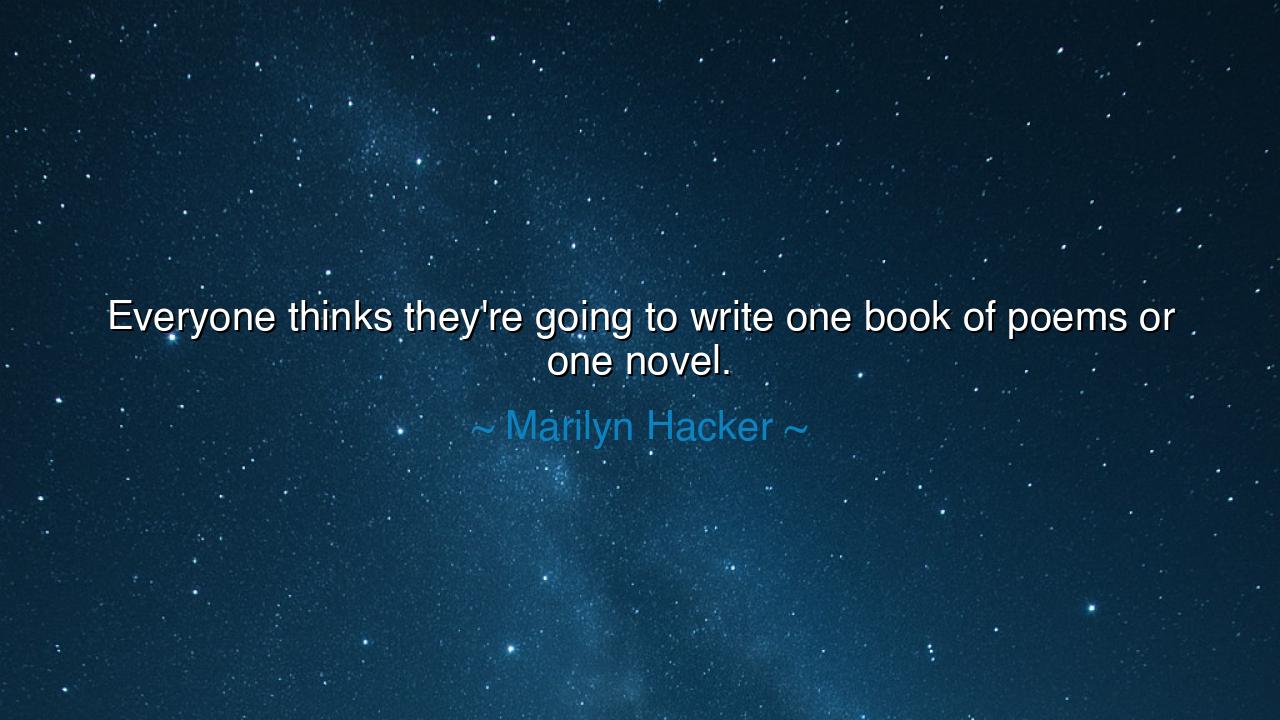
Everyone thinks they're going to write one book of poems or one






In the words of Marilyn Hacker, “Everyone thinks they’re going to write one book of poems or one novel.” This phrase, though simple, carries the echo of ages. It speaks to the universal longing of the human soul: the desire to leave behind a testament, a mark upon the earth that declares, I was here, I lived, I felt, I dreamed. For deep within every heart lies the belief that life, once endured with all its passions and sorrows, deserves to be gathered into words and set before the world.
Yet Hacker also reveals the shadow side of this dream. Everyone thinks they will write, but few persist beyond thought. The vision is often grand, but the labor is immense. To craft even a single book of poems is to wrestle with language until it sings, to bleed onto the page until truth emerges. To write a novel is to journey through a vast terrain of characters, histories, and emotions, often with no clear map. The dream is common, but the perseverance required is rare. Thus her words remind us of the gulf between intention and creation.
History offers us luminous examples. Consider Cervantes, who after years of obscurity and struggle, finally produced Don Quixote. Many men of his time thought they might write a tale, but Cervantes endured poverty, prison, and disappointment before birthing a work that shaped world literature. Or think of the poets of the Harlem Renaissance, like Langston Hughes, who not only dreamed of writing but gave voice to a generation’s soul. Their words remind us that the dream of writing is universal, but its realization demands courage, persistence, and fire.
Hacker’s words also speak of humility. The desire to write is not shameful—it is noble. But one must recognize that the dream alone is not enough. To think of a book is easy; to sit in the silence of the desk day after day, forging words into form, is the true test. In this way, her statement calls us not to abandon the dream, but to honor it with discipline. For if everyone dreams, then what distinguishes the writer is not the dream, but the work.
The deeper meaning here lies in the mystery of creation itself. Human beings long to order their lives into story, to find patterns, to make meaning. This is why so many imagine writing at least once—because we know that our days slip quickly into oblivion unless they are captured in words. The book of poems or the novel becomes a symbol of immortality, a way to ensure that one’s laughter, one’s grief, one’s wisdom will not vanish with the body, but continue to speak.
The lesson, then, is this: do not be content with dreaming of writing. If the thought has entered your heart, honor it. Begin, even if your words stumble. Write not because the world demands it, but because your soul does. For though everyone thinks they might write, only those who act will find the joy of leaving behind a living monument of their own spirit.
Practically, this means carving time from the noise of the world. Keep a notebook, write daily, shape fragments into form. Read widely, for the voices of others will sharpen your own. And when doubt whispers, remember that all great books began as trembling sentences, all mighty poems as fragile lines. By persistence, the dream becomes flesh.
Thus, Marilyn Hacker’s words remind us both of the universality of the writer’s longing and of the rarity of its fulfillment. Everyone thinks they will write—but only those who labor turn thought into song. Let this be your call, O seeker: do not only think of writing—write. And in so doing, join the long chorus of humanity that has turned fleeting life into eternal word.






HMHuyen My
I find Hacker’s observation interesting because it highlights the pressure many writers face. Why do we often think of writing as a one-off, when in reality, it’s a process of constant learning and evolving? Is it limiting to see writing as something you ‘do once,’ or is this belief part of the excitement of embarking on a creative project? Maybe the real challenge is learning to embrace the journey rather than focusing on one end goal.
DDuy2k8
Hacker’s comment speaks to the misconception that one work, whether a novel or a collection of poems, will define a writer’s career. Is it unrealistic to think that writing is a one-time achievement rather than a continuous journey? Does this idea of ‘one book’ shape how we view our creative output, and does it discourage writers from exploring different genres or styles beyond that initial piece?
THle thi huong
I find this quote thought-provoking because it touches on the expectations that many writers place on themselves. Why is it that we think of writing as something we can sum up in a single work? Could it be that the idea of ‘one book’ comes from a desire for validation or recognition? Does this desire hinder the ongoing, evolving nature of writing, which can be a lifelong process?
HTnguyen huu the
Hacker’s quote resonates with the common belief that every writer has one major work they are destined to create. It makes me wonder, why do so many writers, particularly early on, feel this pressure to produce one book or poem that defines them? Is this pressure a source of creativity, or does it hinder the process by limiting the writer’s ability to explore other possibilities?